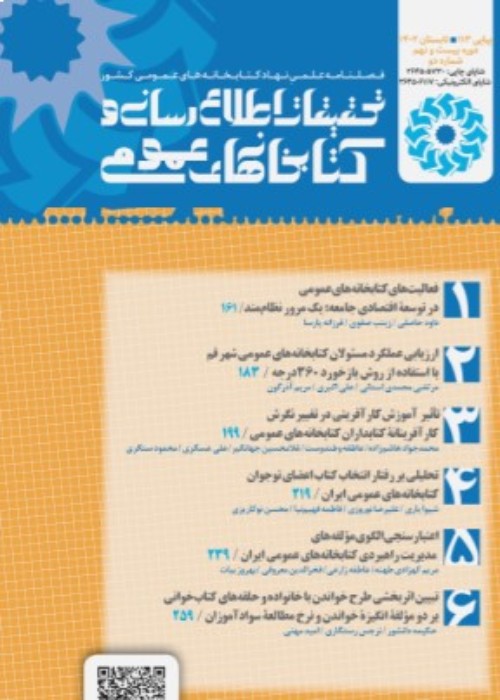Identifying the effective factors on women not using rural public libraries in Kermanshah
In this study, we have tried to identify the factors affecting the non-use of women in rural libraries from the perspective of non-user women, i.e. women who are not members of libraries and are not library users. Library factors, Internet access, accessibility, and service fit to needs are among the items that in most studies have shown the greatest impact on people using libraries. However, due to the fact that less research has examined the problems and challenges facing women in accessing information resources and referring them to libraries, this study was conducted with the main purpose of examining this important issue.
This research has been done with a qualitative approach and using content analysis method. The statistical population of the study consists of non-user women in 8 rural libraries in Kermanshah. Semi-structured interviews were used to collect data and Lincoln and Guba (1985) evaluation method was used to ensure the validity and reliability of the study. In order to achieve and validate the research tool, the research process was performed by two experts and two coders were used to codify several interview samples, to ensure the uniformity of the coders' point of view and to write notes during the research in Excel sheets. By applying this process, the reliability of the research data was significantly increased. The sampling method of the research was snowball and the transcript of the interviews was analyzed by three methods quantitative, structural, and interpretive, and in this regard, the software MAXQDA 2018 was used.
After extracting the main sentences from the text of the interviews and placing them in a file, first conceptualization was done and then according to the extracted concepts, the appropriate category with each concept was selected. In the coding process, each phrase was marked as a corresponding code according to its meaning, concept, and implication under a specific heading, and was classified in the MAXQDA software environment. In the next step, after removing some of the codes that had thematic overlap, four main dimensions including environmental, personal, social and cultural, and special factors were identified and 36 conceptual codes were extracted in this field. Finally, due to the frequency of repetitive concepts, it was found that "special factors" had the greatest impact on women not going to rural libraries and "environmental factors" showed the least role in this regard.
This study has looked at the issue of women's access to information resources and libraries with a different perspective and has focused on non-user women. Obviously, attracting the attention and membership of non-user women to rural libraries can lead to the promotion of knowledge and information of this group and, consequently, a direct impact on the family center and improve the position of the library in the minds of society. Therefore, rural libraries should pay more attention to this important issue and pave the way for providing services to this group.
- حق عضویت دریافتی صرف حمایت از نشریات عضو و نگهداری، تکمیل و توسعه مگیران میشود.
- پرداخت حق اشتراک و دانلود مقالات اجازه بازنشر آن در سایر رسانههای چاپی و دیجیتال را به کاربر نمیدهد.





